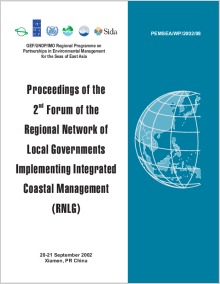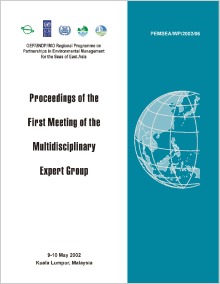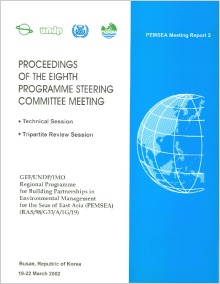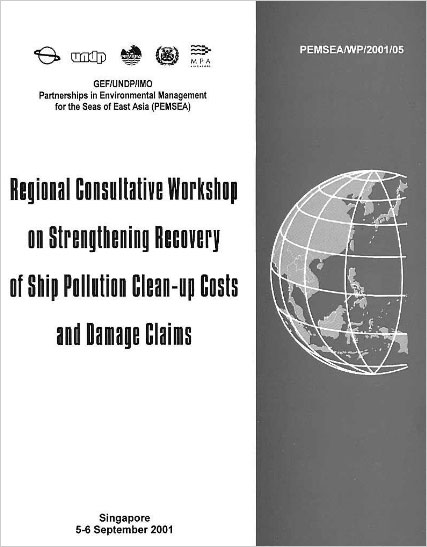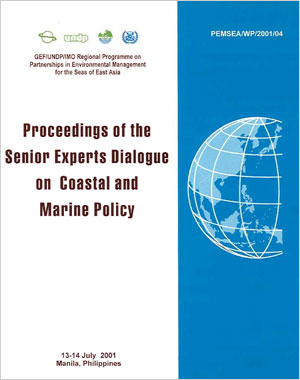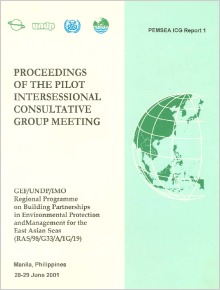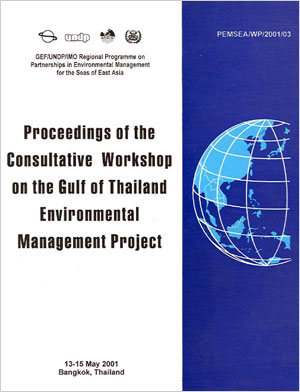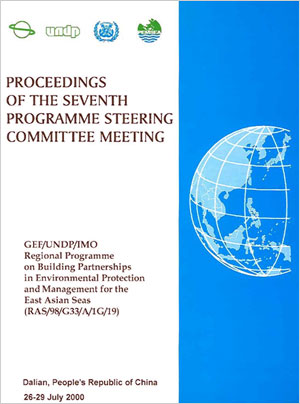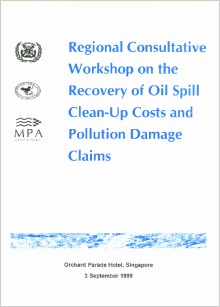
Breadcrumb
-
Proceedings of the 2nd Forum of the Regional Network of Local Governments Implementing Integrated Coastal Management (RNLG) (Xiamen, PR China : 20-21 September 2002)
The Second Forum of the Regional Network of Local Governments Implementing Integrated Coastal Management (RNLG) was organized by the GEF/UNDP/IMO Regional Programme for Partnerships in Environmental Management for the Seas of East Asia (PEMSEA), jointly with the State Oceanic Administration (SOA) of PR China, and hosted by the Xiamen Municipal Government of PR China. The Forum was designed to provide a venue to the respective local governments of participating countries for evaluating progress, achievements, constraints and lessons learned in ICM program development and implementation in their respective demonstration and parallel sites; sharing the experience, lessons and good practices of Xiamen ICM demonstration site; and discussing network operational modality and future activities.
-
Proceedings of the First Meeting of the Multidisciplinary Expert Group
The First Meeting of the Multidisciplinary Expert Group (MEG) was held at Hotel Istana, Kuala Lumpur, Malaysia from 9-10 May 2002. Attending the meeting were seven experts from Indonesia, Hong Kong, Japan, Malaysia, Philippines, Singapore, Thailand, and two from PEMSEA’s Regional Programme Office (RPO). The Meeting was organized to conduct a critical review of scientific and technical quality of major programme outcomes, catalyze the exchange of indigenous and emerging scientific and technological knowledge and explore ways for further development of the MEG as the scientific arm of more effective regional collaborative mechanisms. In doing so, the MEG would also play the role of providing scientific advice for the Programme Steering Committee.
-
Proceedings of the Eighth Programme Steering Committee Meeting
The Eighth Programme Steering Committee (PSC) Meeting of the GEF/UNDP/IMO Regional Programme was held in Busan, Republic of Korea, from 19 to 22 March 2002. The Government of the Republic of Korea hosted the Meeting. The Meeting was attended by delegates from ten participating countries, namely: Cambodia, Indonesia, Japan, Malaysia, the People's Republic of China, the Philippines, the Republic of Korea, Singapore, Thailand and Vietnam. Observers represented at the Meeting were International Atomic Energy Agency (IAEA), International Labour Organization (ILO), United Nations Environment Programme (UNEP/EAS-RCU), UNESCO/IOC Regional Secretariat for WESTPAC, World Bank, East Asia Response Pte. Ltd. (EARL), Maritime State University, Russia, Nippon Foundation, Japan, the International Association of Independent Tanker Owners (INTERTANKO), and Tohoku University, Japan. The Implementing Agency was represented by the United Nations Development Programme (UNDP) Manila and Seoul Country Offices and GEF/UNDP Kuala Lumpur. The Executing Agency was represented by the International Maritime Organization (IMO), London, and the Regional Programme Office (RPO), Manila.
-
Regional Consultative Workshop on Strengthening Recovery of Ship Pollution Clean-up Costs and Damage Claims
The Regional Consultative Workshop on Strengthening Recovery of Ship Pollution Clean-up Costs and Damage Claims was held in Singapore, on 5-6 September 2001. The Workshop brought together participants from East Asian Seas countries to interact with each other and with the international community. The Workshop included focused discussions on the implementation of international instruments dealing with liability for pollution from ships and compensation of related damages and proposals for strengthening capacities at national and regional level. The Workshop was co-organized by the Regional Programme on Partnerships in Environmental Management for the Seas of East Asia (PEMSEA) and the Maritime and Port Authority of Singapore (MPA Singapore).
-
Proceedings of the Senior Experts Dialogue on Coastal and Marine Policy
The Senior Experts Dialogue on Coastal and Marine Policy was organized by the GEF/UNDP/IMO Regional Programme for Partnerships in Environmental Management for the Seas of East Asia (PEMSEA) in Manila, Philippines, on 13-14 July 2001. Eleven participants from nine countries of the East Asian Seas region attended the workshop. The workshop was designed to provide some of the region’s recognized experts in coastal and marine policy an opportunity to brainstorm on a host of issues facing the East Asian Seas region especially in light of the impacts of economic globalization on the coastal and marine environment and natural resources.
-
Proceedings of the Pilot Intersessional Consultative Group Meeting
The Meeting of the Pilot Intersessional Consultative Group (ICG) of the GEF/UNDP/IMO Regional Programme was held in Manila, Philippines, from 28 to 29 July 2001. The Meeting was attended by delegates from 10 participating countries, namely: Cambodia, the Democratic People’s Republic of Korea, Indonesia, Malaysia, the People’s Republic of China, the Philippines, the Republic of Korea, Singapore, Thailand and Viet Nam. The Implementing Agency was represented by the United Nations Development Programme (UNDP) Manila. The Executing Agency was represented by the Regional Programme Office (RPO), Manila.
-
Proceedings of the Consultative Workshop on the Gulf of Thailand Environmental Management Project
The Consultative Workshop on the Gulf of Thailand Environmental Management Project was held at the Menam Riverside Hotel in Bangkok, Thailand, on 14-15 May 2001. The workshop was hosted by the Harbour Department, Ministry of Transport and Communications, Thailand. The workshop was attended by delegates from the four littoral States of the Gulf of Thailand: Cambodia, Malaysia, Thailand and Viet Nam. Representatives from international agencies and NGOs with environmental programmes, projects and activities in the Gulf of Thailand were in attendance as well, including: Food and Agriculture Organisation of the United Nations (FAO), United Nations Environment Programme/East Asian Seas Regional Coordinating Unit (UNEP/EAS-RCU), the Intergovernmental Oceanographic Commission/Subcommission for the Western Pacific (IOC/WESTPAC), the Southeast Asian Programme in Law, Policy and Management (SEAPOL), and the Southeast Asia START Global Change Regional Center (SEA-START RC). The Implementing Agency for PEMSEA was represented by the United Nations Development Programme (UNDP) Bangkok Country Office. The Executing Agency was represented by the Regional Programme Office (RPO), Manila.
-
Proceedings of the Seventh Programme Steering Committee Meeting
This publication summarizes the results of the Seventh Programme Steering Committee (PSC) Meeting of the GEF/UNDP/IMO Regional Programme, held in Dalian, People's Republic of China, from 26 to 29 July 2000. The Meeting was hosted by the Government of the People's Republic of China. The Meeting was attended by delegates from all eleven participating countries, namely: Brunei Darussalam, Cambodia, Democratic People’s Republic of Korea, Indonesia, Malaysia, People’s Republic of China, Philippines, Republic of Korea, Singapore, Thailand and Vietnam. Observers represented at the Meeting were the Food and Agriculture Organization of the United Nations (FAO), United Nations Environment Programme (UNEP)/Regional Coordinating Unit (RCU), the Intergovernmental Oceanographic Commission/Subcommission for the Western Pacific (IOC/WESTPAC), Southeast Asian Fisheries Development Center (SEAFDEC), Stockholm University, World Resources Institute (WRI) and World Wildlife Fund (WWF).
-
Regional Consultative Workshop on the Recovery of Oil Spill Clean-Up Costs and Pollution Damage Claims
This publication summarizes the results of the Regional Consultative Workshop on the Recovery of Oil Spill Clean-up Costs and Pollution Damage Claims which was jointly organized by the Maritime and Port Authority (MPA) of Singapore and the GEF/UNDP/IMO Regional Programme for the Prevention and Management of Marine Pollution in the East Asian Seas. The workshop followed a successful two-day conference organized by the MPA, Singapore, on 1-2 September 1999, entitled “International Oil Pollution Conference and Exhibition 99” (IOPCE 99). The workshop was designed to provide senior officials from countries of the East Asian Seas region an opportunity to discuss issues and priorities with regard to implementation of the Civil Liability and Compensation (CLC) Convention and the Fund Convention (FUND). Representatives from nine countries of the East Asian Seas region attended the IOPCE ‘99 and workshop. Four resource persons participated in the workshop, representing the International Oil Pollution Compensation Funds (IOPC Funds), the International Tanker Owners Pollution Federation Ltd. (ITOPF), the Faculty of Law, National University of Singapore, and the MPA, Singapore.
